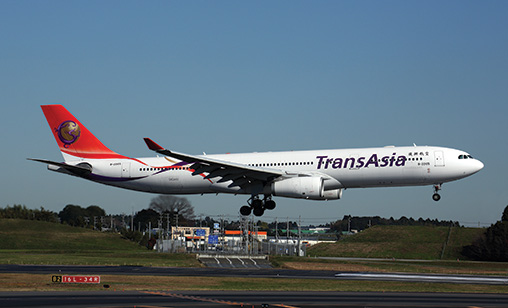News Backgrounder
TransAsia collapse resets aviation in turbulent Taiwan
February 1st 2017
In the week leading to the Chinese Lunar New Year last month, Taiwan’s Civil Aeronautics Administration (CAA) reassigned routes operated by defunct TransAsia Airways to its former rivals. Read More »
Fierce competition among China Airlines (CAL), EVA Airways and their respective subsidiaries prompted the CAA to include a caveat to the reassignment: airlines awarded lucrative cross-strait routes must add largely unprofitable links to Taiwan’s outlying Kinmen and Penghu Islands as part of their deals.
 |
EVA Air and CAL’s Mandarin Airlines were handed TransAsia’s bread-and-butter Songshan-Shanghai Pudong flights, while EVA’s UNI Air was assigned Taoyuan-Pudong. Songshan is Taipei’s capacity-restricted downtown airport. Taoyuan is its national hub airport, some 40kms west of the capital.
CAL also was given the Taichung-Pudong trunk route, which Far Eastern Air Transport will operate between Songshan and Fuzhou. CAL’s low-cost offshoot, Tigerair Taiwan, will fly between Taoyuan and Wuxi.
The CAA said routes between the two capital city airports, Kaohsiung and the Kinmen and Penghu Islands will be jointly serviced by Far Eastern, Mandarin Airlines and UNI Air. Unprofitable Taichung-Hualien and Songshan-Hualien flights were reassigned to Mandarin Airlines and UNI Air, respectively.
On January 12, TransAsia’s shareholders voted to officially dissolve Taiwan’s oldest private airline, which was founded in 1951, because of heavy debts and widening losses. TransAsia and its approximately 1,800 unionized workers have not been able to reach an agreement for compensation since the airline’s unexpected closure on November 22.
Former TransAsia chairman, Vincent Lin, has proposed employee compensation, immediately rejected by staff, of two months’ salary and a US$317 one-off bonus. The union’s demands for a better deal have not been met.
Despite TransAsia’s shutdown, Far Eastern Air Transport, which holds more than 10% in the airline, has re-affirmed its interest in a takeover of the failed carrier. Far Eastern chairman, ‘turnaround king’ Fenno Chang, said his company could still take over TransAsia if it received approval from the airline’s creditor banks and the courts, in which case the shareholders vote would be disregarded.
In December, Chang said he was “80% certain we will be able to take over TransAsia”, following advanced discussions with lenders and other relevant parties, but when asked about a mooted Far Eastern bid, TransAsia’s largest creditor bank, Mega International Commercial Bank, said the banks wanted to secure a buyer for the airline’s aircraft to offload debt.
Mega International said TransAsia owed it more than NT$11 billion ($345 million), money most easily recovered by TransAsia aircraft. TransAsia operated a fleet of eight A320s, 11 A321s, four A330s and 13 ATRs, although it only owns 11 planes, including two A330-300s and five A320ceos.
Lin said 30 to 40 potential buyers have shown interest in the aircraft, with some wanting all 11 planes, while others are seeking to purchase one aircraft each. The sales agreements are expected to be signed following the Lunar New Year with the aircraft delivered in March or April, he said.
TransAsia’s Airbus orders will most likely be cancelled, attracting penalties and adding to its debt pile, although Airbus Singapore said the carrier’s outstanding orders “remain in the order book” for now.
Airbus won’t need to look far for airlines willing to take over the delivery slots for six A321neos starting this year, but the search for suitors for four A330-800neos from 2018 might prove more difficult as A330neo sales have been slower than expected.
Airbus has received 214 A330neo orders to February, with 84 of them from Asia-Pacific carriers: AirAsia X (66), Garuda Indonesia (14) and the four planes confirmed by TransAsia and reported to be ordered for “not more” than $480 million in 2014.
Four months ago CAL, EVA, their Mandarin Airlines and UNI Air offshoots, Far Eastern, Tigerair Taiwan, V Air and TransAsia served Taiwan and its population of 24 million people. The latter two are now history and Tigerair’s Taiwan unit has been fully folded into the CAL Group. This effectively leaves Taiwan in the hands of its two heavyweight carriers, CAL and EVA. Even if TransAsia is revived by Far Eastern, it will be a significantly smaller operation focused on cross-strait traffic.